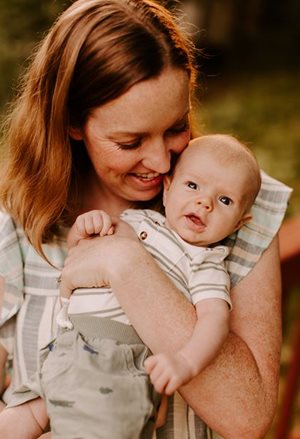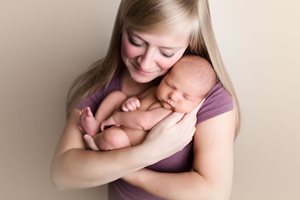An OB/GYN, gastroenterologist and a pharmacist—all women, all pregnant during COVID—share their stories of being vaccinated during their pregnancy.
Dr. Mia Hindi, Deaconess Clinic Gastroenterology
I received my COVID vaccine in January 2021, shortly after they became available to healthcare workers when I was 18 weeks pregnant with my third child. This decision was made with the support and encouragement of Dr. Kara Geoghagan, my OB/GYN at Women’s Health Care P.C., as well as from my husband, who is also a physician.
As a gastroenterologist, I provided care for many COVID-positive patients who were hospitalized. I also cared for pregnant women who had contracted COVID-19 and had severe symptoms requiring admission to the ICU.
I also believe that as a healthcare worker, it is my duty to protect my colleagues and patients from getting COVID-19, as we know that the vaccine decreases the rate of transmission of the virus. Being vaccinated also helps me stay healthy and able to provide patient care.
I am grateful that I had the opportunity to have early access to the vaccine, helping me protect me, my baby and my patients.
Katie Theising, PharmD, BCPS, Clinical Staff Pharmacist
 I received the first dose of the COVID vaccine in December 2020, the first week they were offered here at Deaconess. I was 16 weeks pregnant with my 4th child at the time. I chose to get vaccinated to protect myself and my baby from serious COVID complications. As a clinical pharmacist who works in the ICU, I've seen first-hand how devastating COVID can be.
I received the first dose of the COVID vaccine in December 2020, the first week they were offered here at Deaconess. I was 16 weeks pregnant with my 4th child at the time. I chose to get vaccinated to protect myself and my baby from serious COVID complications. As a clinical pharmacist who works in the ICU, I've seen first-hand how devastating COVID can be.
Being vaccinated early in the vaccine rollout, I didn't have the data and strong recommendations from organizations like ACOG to base my decision on that pregnant women do now. However, I carefully read the clinical trial data from Pfizer and felt comfortable with the risk-benefit ratio for myself and my baby. I have complete trust in my OB/GYN who also supported my decision to get vaccinated. After receiving my vaccine, I enrolled in a study to hopefully provide data to help other women make the decision to get vaccinated. The only side effect I experienced from the vaccine was a mildly sore arm.
I know of multiple pregnant women in my personal and professional life who have experienced severe COVID and hospitalization, and I'm grateful for the opportunity to be vaccinated to avoid that for myself. Studies are also showing that babies also get COVID antibodies if their mothers are vaccinated during pregnancy.
As of the date of this article, my baby is 6 months old now, and he is healthy and thriving, and was born full term without complications. This summer, during the Delta variant surge, my oldest child caught COVID at daycare and transmitted it to myself and my three other children, including my baby (9 weeks old at the time). Thankfully all of our symptoms were extremely mild. I had a headache and fever for about 12 hours and mild congestion for about a week. My baby had a low fever for about 12 hours and never developed any other symptoms. I'm confident the vaccine helped keep our cases mild.
Since then, I received my booster while continuing to breastfeeding my baby, who was 4 months old at the time. As a healthcare worker, I received the recommended booster to continue to protect my patients, coworkers, and loved ones from the unpredictability of the Delta variant.
Dr. Carrye Daum, OB/GYN, Women’s Health Care P.C.
 As an OB/GYN physician married to an Emergency Medicine physician, my choice regarding COVID-19 vaccination has been clear from the get-go. After so many months of stress, isolation and loneliness, so many sick patients, so many deaths, so many families affected, so many lives changed forever – I wanted to do my part to protect myself, my patients, and my loved ones against this terrible illness.
As an OB/GYN physician married to an Emergency Medicine physician, my choice regarding COVID-19 vaccination has been clear from the get-go. After so many months of stress, isolation and loneliness, so many sick patients, so many deaths, so many families affected, so many lives changed forever – I wanted to do my part to protect myself, my patients, and my loved ones against this terrible illness.
I have frequent discussions with patients regarding the decision to vaccinate during pregnancy, while breastfeeding and while trying to conceive. I also have the perspective of receiving the COVID vaccine myself while breastfeeding, pregnant, and still desiring future fertility.
Regarding vaccination in pregnancy, our national OB/GYN professional organizations, including ACOG, recommend vaccination of pregnant individuals. Data has shown us that— simply put— vaccination is safe in pregnancy and COVID infection is not. COVID infection puts pregnant patients at an increased risk of hospital admission, as well as severe complications including ICU admission and death. The COVID vaccine has not been shown to increase risk of miscarriage, and the vaccine itself does not cross the placenta; however, the antibodies DO cross the placenta, which is potentially a huge benefit for a fetus.
COVID vaccination is also recommended for lactating women. I was breastfeeding my 4-month-old baby boy at the time the vaccine was made available to healthcare workers in December 2020. I jumped at the chance to protect not only myself but also my baby. I received my first dose of the vaccine in December 2020 and my second dose in January 2021, both while breastfeeding. We know that when a breastfeeding mother receives the vaccine, she develops COVID antibodies, which are then passed to the baby through breast milk. I did not want to miss this chance to potentially help protect my baby.
Regarding fertility, there is SO much misinformation on the internet concerning the COVID vaccine and its possible effects on fertility. The truth is that the vaccine has not been found to impact male or female fertility OR fertility treatment outcomes. In fact, the American Society for Reproductive Medicine states, “COVID-19 vaccination is recommended for women who are contemplating pregnancy or who are pregnant in order to minimize risks to themselves and their pregnancy.”
To provide some personal background with regard to fertility, I have been through years of fertility treatments and required IVF for our pregnancy in 2019-2020. We welcomed our baby Walker in summer 2020, and he is the baby mentioned above, whom I was breastfeeding while I received my vaccines in December 2020 and January 2021. By the end of January, I was feeling sick daily. I figured I didn’t have COVID since I was vaccinated, but I never expected that it was actually because I was PREGNANT (on our own!) I have joked that the COVID vaccine doesn’t cause infertility—in fact, it seems to have done the opposite in my case!
As it turned out, I actually received my second dose of the vaccine not only while breastfeeding Walker but also while being very early pregnant with my next baby, Tucker. I went on to have a safe delivery in September 2021. I am currently breastfeeding Tucker, and I received my booster dose of the COVID vaccine when he was 4 weeks old. I feel reassured about the fact that I received three doses of the vaccine, once while pregnant and all while breastfeeding and still desiring future fertility.
In discussing the vaccine with my patients, there are many points to consider. The longer we experience poor vaccination rates, the more opportunity this virus has to continue to mutate and create new variants that could be more harmful. The virus is so prevalent that we are all truly faced with choosing what we want to go up against— the virus or the vaccine. People aren’t staying home anymore. Most people aren’t masking anymore. It’s much harder to be confident that we can avoid both the virus and the vaccine at this point.
The vaccine comes with minimal risk. You might get a sore arm, fever, body aches, etc. Better to put up with that for a day or two than to actually put yourself and your family members at risk of serious harm. The serious risks of the vaccine have been proven to be very rare, and there is NO zero risk option when it comes to vaccine vs. virus. The COVID virus itself has many harmful, potentially devastating and long-lasting effects.
I wish I could say that the vaccine guarantees full protection against COVID, but it does not. However, the potential risk vs. potential benefit ratio still falls heavily on the side of the vaccine. Breakthrough cases in vaccinated individuals are milder than unvaccinated cases. There are much lower rates of hospitalization and death among those who received the vaccine compared to those who did not. These statements have been proven across the nation through the recent Delta variant trends.
This vaccine is considered safe and continues to be recommended by medical professionals. It is recommended for individuals who are pregnant, lactating, desiring future fertility, and attempting to conceive. I have never questioned my own decisions to receive both initial doses of the vaccine as well as the booster, even with the circumstances detailed above regarding pregnancy, breastfeeding, and fertility. If you remain on the fence about getting vaccinated, please strongly consider doing so to help yourself, your loved ones, and those around you.
To learn more about COVID-19 vaccines, or to schedule a vaccination appointment, visit www.deaconess.com/Coronavirus/COVID-19-Vaccine-Locations.